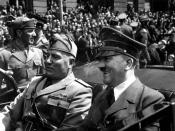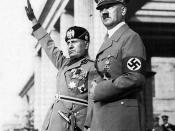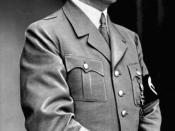The years leading up to 1933 in Germany were filled with unsureness and a lack of confidence among the German people, causing them to search for new solutions and new leaders. It was these circumstances that forced the people to search to the extremes of the political spectrum, either to the extreme left or the extreme right. Hitler and his Nazi party were one of the few parties offering solutions to the political, economic, and social dilemmas, which appealed to the majority of the German population.
The political instability in Germany was one of the major factors that helped Hitler acquire power. The 1929 leaders of Germany, part of the Muller's Grand Coalition, did not appeal to the general population following the governments involvement in dealing with the Allies through the Dawes and Young Plans. A group, including Hugenberg, who owned over 100 newspapers, and Hitler, was set up to oppose the Young Plan.
Though the Coalition was able to suppress this opposition, the general population was introduced to Hitler and his right wing policies.
After the Muller Coalition was forced to resign due to financial problems throughout Germany, Bruning was appointed Chancellor. His policies however were not as favourable to the general population as he had thought. When the Reichstag opposed Bruning, he ordered them to be eliminated and called an election, hoping the population was behind his actions. Instead the people voted for the Nazi party, whose 25-point programme appealed to the general population. Hitler's beliefs of national unity and equality of rights for the German People were sensible strong beliefs that showed Hitler's devotion to the German people.
Hitler's policies which related to the economy were also firm but sensible policies in the eyes of the greatly unsure German population, who were sceptical of...


